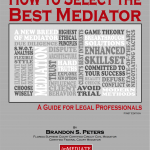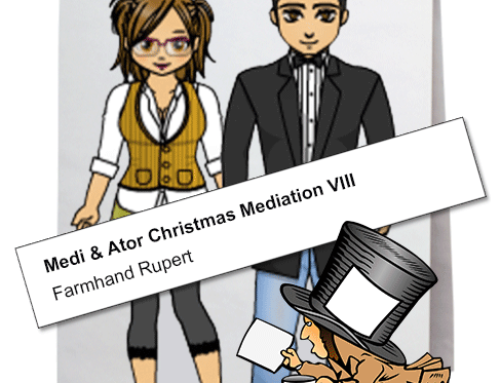 Today I received an e-book from an American Mediator: “How to Select the Best Mediator”. The author is Brandon S. Peters. Maybe better to call that book: “How to Select the best Fitting Mediator”. Now I wonder: What is the best mediator at all? In Germany, the “certified mediator” is seen as a mark of quality. In fact it is not.
Today I received an e-book from an American Mediator: “How to Select the Best Mediator”. The author is Brandon S. Peters. Maybe better to call that book: “How to Select the best Fitting Mediator”. Now I wonder: What is the best mediator at all? In Germany, the “certified mediator” is seen as a mark of quality. In fact it is not.
From the customer’s point of view it’s implicitness that a mediator knows his craft. To give an example: I would be irritated if the mechanican explains to me that he has learned his handcraft when I ask him to repair my car. I honestly am not at all interested to learn whether or where he passed his studies and how he managed his exam. I just assume that he knows what he is doing. Isn’t it suspicious then, when mediators point out their studies and exams? It is not convinvable for a customer to hear: „Oh, did you know, I really have passed some studies and I am certified mediator now with 120 hours of training!“. This I feel, says a lot of the one who needs to point out what is natural in fact.
I very much agree with Peter Brandon, to point out different types and styles of mediation. A mediator who is familiar with this will offer various kinds of mediation to the parties and negotiate the way, which the best is fitting the problem to be solved. This of course needs him to either know and to also master different ways and kinds of mediation. Not sure if that really is known by most of the mediators. I see it a liability, where the mediator misses introducing and negotiating that issue at the beginning of mediation, at least because it has consequences for costs, duration and depth of mediation.
I also like that Peter Branden pointed out game theory and strategical issues. Mostly they are not seen as to be a part of mediation. Star mediators by the way, who have been trained by schools of integrated mediation, do know about pretty well.
Peter Brandon’s view on mediation seems to be impacted very much by lawyer’s thinking. I like his SWOT analysis though I would see the items to be addressed a bit differently. Star mediators do also include lawyer’s way of thinking. The same way they know how to include the psychological way of thinking. From their point of view mediation is to be seen a process as well in juridical like in psychological manners. The psychological understanding of mediation is broadening its use tremendously. Now we gain even more options how to deal with mediation.
What Peter Brandon calls the eclectic mediation is close to the idea of integrated mediation. Integrated mediation could be added a further way of mediation therefore. It allows a systemic view on processes where “Precise listening” for example became a technique. Integrated Mediation developed this technique, to affiliate the interfaces of disciplines and procedures in a not redundant way. It allows developing mediation though it is not in the parties’ view. An Integrated Star Mediator therefore and for example is able to create mediation out of paraphrases reacting on killer phrases step by step.
Recently I joined a talk where I have been asked how a good mediator can be identified. This is really an intriguing question. My answer was: “A criterion for me would be the flexibility and facility how the mediator is able to fit the procedure to the fuss.”
How can you prove or identify this ability now? It will be visible by the mediator’s attitude, the way of thinking and the ability to either not think or better said to think precisely as we learned from Socrates by the Maieutic. This is not to be expressed by completed hours of training. Also not by the way how he is able to create the business cards and letterheads. Rather, as he is dealing with himself and his environment. The school might give an indication. Where this competence and view on oneself is emphasized in training, one might assume that this might become the typical attitude of the trainees.
What we learn now is, that these criteria makes the selection of the “best mediator” very difficult. At least it is due to questions of trust and recommendation. It definitely is not a question, whether I may call me “certified mediator” or not. The “certified mediator” is not even an indication of quality. This kind of certification proves only, that the mediator should have a minimum knowledge. Actually we know that this is not even enough to be a mediator for example showing up what Peter Brandon describes as to be a consequence. His SWOT analyses will help the customer to find the fitting mediator where he takes in consideration that one can master facilitative mediation, another one the evaluative mediation and the next one the transformative mediation. In reality and according to the experience I gained through mediation, the borders are not fixed why eclectic mediation or maybe better, integrated mediation is the mean to go through the variety of the process.
We could make a start, using the term “mediation” not that generally and inflationary but a bit more differentiated. Mediation is not the same as mediation. It should be the mediator knowing this – not the customer!!!
However I appreciate it very much that Brandon Peters offers his e-book to be distributed freely. That is why I like to hint his web-side. You find it here. The e-book you will find by clicking here or on that picture above.
Thank you Brandon Peters.






Leave A Comment
You must be logged in to post a comment.